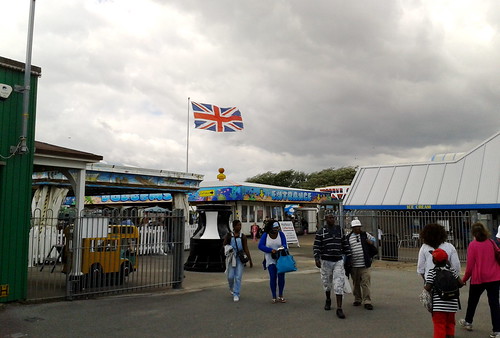So it was on to War of The Worlds. Yet another story we believe we know so well, but which again I had never read, though of course it lurks in the memory from the days of BBC2 horror movies, the recent (I'm sure) dreadful film with Tom Cruise, and the Orson Welles radio thing. This book is a thrilling, rollicking romp, sweeping from Crawley on through the entire universe and taking in politics and philosophy along with the requisite adventure and science. I found the soldier particularly fascinating, with his revolutionary ideas and his expositions on the frailty of the human character, while the poignant isolation of the narrator after the affair struck a chord for a man like myself about to enter his sixth decade. Great stuff.
By now I had been bitten by the Wells bug, and moved swiftly on to The Invisible Man - another tale so deeply ingrained in our consciousness that there was even a TV series made out of it with David McCallum, and yet the original tale was unknown to me. It is a remarkable read, betraying perhaps its embryonic episodic release in pamphlet form with noticeably abrupt (though ultimately, this adds to the power of the work, rather than diminishing it, as if the very shock of the changes deepens the experience) switches of style: from slapstick humour to shocking violence, to melancholy philosophical treatise. The laughs are real laughs, the violence truly violent, and the philosophy deep and meaningful. All of this told in short, breathless chapters which drive the action relentlessly on, page by page by page. The ending intensely evokes a sense of sombre thoughtfulness - musings on our place in a cold, lonely and infinite universe. Not to mention of course the place of the Invisible Man in City's pantheon of fabulous chants.
The Invisible Man led me to read a little about the author himself, and I was then even more intrigued. It's worth looking up his Wikipedia page to find out more, but he led an extraordinary private life alongside his enormous written output, and was a visionary socialist thinker (I know, I know. Everyone was racist then. And a eugenicist) in tandem with his visionary scientific explorations. So it was that I visited the library, and there took out The Island of Dr Moreau, maybe not quite as fixed in the imagination as the Time Machine, War of The Worlds or The Invisible Man, yet still famous enough I guess, and certainly very well known by fans of science fiction. This was a venture even deeper into the mysteries of human existence, a treatise on god and man and civilisation set - in the best Defoe/Stephenson tradition - on a remote Pacific island. A superb work, where the reader feels transformed almost as much as the narrator by the end, and where surely Maurice Sendak took much of his inspiration for Where The Wild Things Are. The creatures and themes of the book still echo in my mind, some two weeks after finishing it.
My next (and current) book of Wells is The Shape Of Things to Come, which is so far the least familiar of any I've yet read, though it is not obscure, and I remember some pastiches or adverts from years ago. It is, up to the point I've reached so far, a real exploration of history, of the insanity of the economic model, clearly influenced strongly by the horrors of the Great War, and the need to create something meaningful and optimistic out of the carnage of 1914-18. There is a telling swipe at Winston Churchill:
"He displays a vigorous naive puerility that still gives his story an atoning charm. He has the insensitiveness of a child of thirteen. His soldiers are toy soldiers and he loves to knock over a whole row of them."
But, more than this, his critique of the Great War, and of the economic circumstances which brought it into being, which nurtured it through the terrible years of conflict and beyond, is searing. There are many parallels with the insanity of our current situation, a lesson from the past pretending to be from the future, which feels as prophetic as if it actually were written many years hence:
"With difficulty will the student let down his mind into the fantastic world of extinct imaginations in which these strange personifications, as monstrous and incredible as the ancient gods of India, were treated as real and morally responsible individuals, hated, trusted, feared and loved. The war was, in immediate fact, an aimless and fruitless slaughter upon the altars of these stupendous deities, the wounding and mutilation of perhaps twenty million human beings, and a vast burning-up of material wealth. In the crazy fancy of our ancestors it was a noble and significant struggle."



1 comment:
This article is presently what did you say? I need, thank you.
Post a Comment